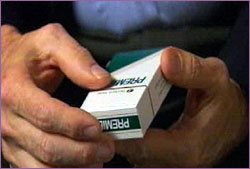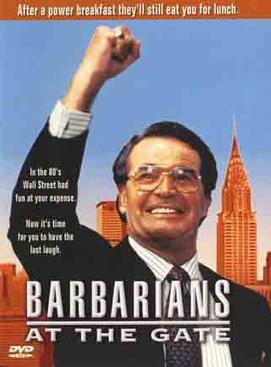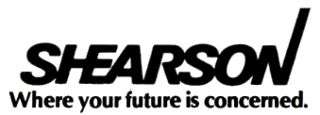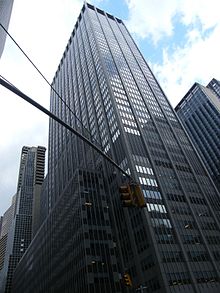
A leveraged buyout (LBO) is one company's acquisition of another company using a significant amount of borrowed money (leverage) to meet the cost of acquisition. The assets of the company being acquired are often used as collateral for the loans, along with the assets of the acquiring company. The use of debt, which normally has a lower cost of capital than equity, serves to reduce the overall cost of financing the acquisition. This is done at the risk of magnified cash flow losses should the acquisition perform poorly after the buyout.

The R. J. Reynolds Tobacco Company (RJR) is an American tobacco manufacturing company based in Winston-Salem, North Carolina. Founded by namesake R. J. Reynolds in 1875, it is the largest tobacco company in the United States. The company is a wholly owned subsidiary of Reynolds American, itself a wholly owned subsidiary of British American Tobacco.
Private equity (PE) is stock in a private company that does not offer stock to the general public. In the field of finance, private equity is offered instead to specialized investment funds and limited partnerships that take an active role in the management and structuring of the companies. In casual usage, "private equity" can refer to these investment firms, rather than the companies in which they invest.

Nabisco is an American manufacturer of cookies and snacks headquartered in East Hanover, New Jersey. The company is a subsidiary of Illinois-based Mondelēz International.

Premier was an American brand of smokeless cigarettes which was owned and manufactured by the R.J. Reynolds Tobacco Company (RJR). Premier was released in the United States in 1988. It was the first commercial heated tobacco product. However, it was difficult to use and tasted unpleasant; as a result, it was unpopular with consumers. A commercial failure, the brand was a significant financial loss for RJR and was quickly taken off the market.

KKR & Co. Inc., also known as Kohlberg Kravis Roberts & Co., is an American global investment company. As of December 31, 2023, the firm had completed private equity investments in portfolio companies with approximately $710 billion of total enterprise value. Its assets under management (AUM) and fee paying assets under management (FPAUM) were $553 billion and $446 billion, respectively.

Henry Roberts Kravis is an American businessman, investor, and philanthropist. He is a co-founder of KKR & Co. Inc.

Forstmann, Little & Company was an American private equity firm, specializing in leveraged buyouts (LBOs). At its peak in the late 1990s, Forstmann Little was among the largest private equity firms globally. Ultimately, the firm would suffer from the bursting of the internet and telecom bubbles, having invested heavily in technology and telecommunications companies. Following the death of the last surviving founder, Theodore Forstmann, in 2011, the firm was dissolved and its assets sold off. It closed in May 2014.

Barbarians at the Gate is a 1993 American biographical comedy-drama television film directed by Glenn Jordan and written by Larry Gelbart, based on the 1989 book of the same name by Bryan Burrough and John Helyar. The film stars James Garner, Jonathan Pryce, and Peter Riegert. It tells the true story of F. Ross Johnson, who was the president and CEO of RJR Nabisco.
Frederick Ross Johnson, OC was a Canadian businessman, best known as the chief executive officer of RJR Nabisco in the 1980s.
Jerome Kohlberg Jr. was an American businessman and investor. He was an early pioneer in the private equity and leveraged buyout industries founding private equity firm Kohlberg Kravis Roberts & Co. and later Kohlberg & Company.

Reynolds American, Inc. is an American tobacco company which is a subsidiary of British American Tobacco and is the second-largest tobacco company in the United States. Its holdings include R. J. Reynolds Tobacco Company, American Snuff Company, Santa Fe Natural Tobacco Company, and Niconovum AB.

Del Monte Foods Inc. is an American food production and distribution company and subsidiary of NutriAsia, headquartered in Walnut Creek, California. Del Monte Foods is one of the largest producers, distributors and marketers of branded processed food for the U.S. retail market, generating approximately $1.73 billion of annual sales. Its portfolio of brands includes Del Monte, S&W, Contadina, College Inn, Kitchen Basics, Joyba, and Take Root. Greg Longstreet is the current Chief Executive Officer of Del Monte Foods. Several Del Monte products hold the number one or two market share position. The company also produces, distributes and markets private-label food.

The history of private equity, venture capital, and the development of these asset classes has occurred through a series of boom-and-bust cycles since the middle of the 20th century. Within the broader private equity industry, two distinct sub-industries, leveraged buyouts and venture capital experienced growth along parallel, although interrelated tracks.

Private equity in the 1980s relates to one of the major periods in the history of private equity and venture capital. Within the broader private equity industry, two distinct sub-industries, leveraged buyouts and venture capital experienced growth along parallel although interrelated tracks.

Private equity in the 1990s relates to one of the major periods in the history of private equity and venture capital. Within the broader private equity industry, two distinct sub-industries, leveraged buyouts and venture capital, experienced growth along parallel although interrelated tracks.

Shearson was the name of a series of investment banking and retail brokerage firms from 1902 until 1994, named for Edward Shearson and the firm he founded, Shearson Hammill & Co. Among Shearson's most notable incarnations were Shearson / American Express, Shearson Lehman / American Express, Shearson Lehman Brothers, Shearson Lehman Hutton and finally Smith Barney Shearson.
Peter A. Cohen is the chairman and CEO of Andover National Corporation, a public holding company. He was formerly the chairman and CEO of Cowen Inc., also known as Cowen & Company now TD Cowen. Prior to his current role, Cohen founded Ramius Capital Management in 1994, a $13 billion investment firm, which he merged with Cowen Inc. in 2009. Prior to this, Cohen was the chairman and chief executive officer of Shearson Lehman American Express from 1983 through 1991.

Barbarians at the Gate: The Fall of RJR Nabisco is a 1989 book about the leveraged buyout (LBO) of RJR Nabisco, written by investigative journalists Bryan Burrough and John Helyar. The book is based upon a series of articles written by the authors for The Wall Street Journal. The book was made into a 1993 made-for-TV movie by HBO, also called Barbarians at the Gate. The book centers on F. Ross Johnson, the CEO of RJR Nabisco, who planned to buy out the rest of the Nabisco shareholders.

Chun King was an American brand of canned Chinese food products founded in the 1940s by Jeno Paulucci, whose company also developed Jeno's Pizza Rolls and frozen pizza, and the Michelina's brand of frozen food products, among many others. By 1962, Chun King was bringing in $30 million in annual revenue and accounted for half of all U.S. sales of prepared Chinese food. In 1966, it was sold to the R. J. Reynolds Tobacco Company for $63 million.














